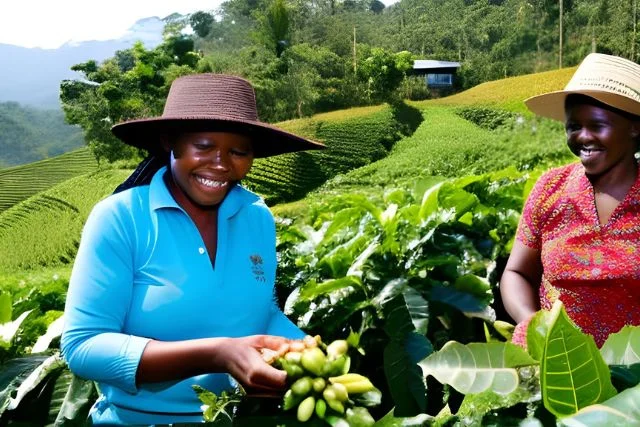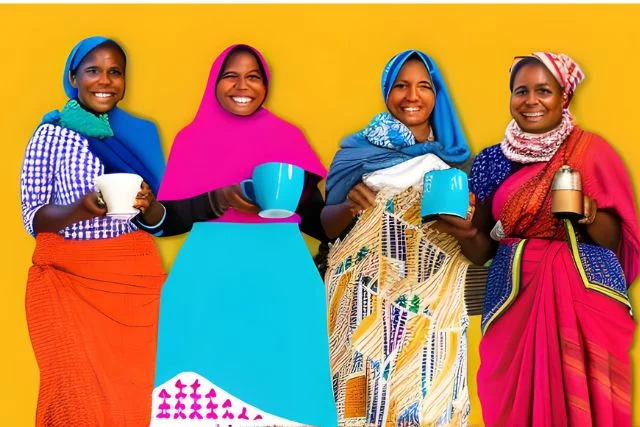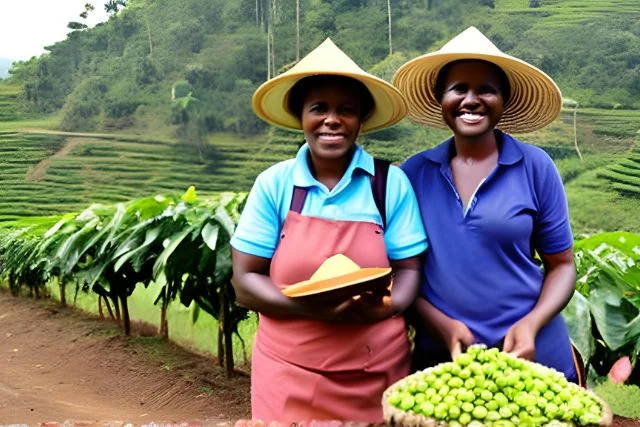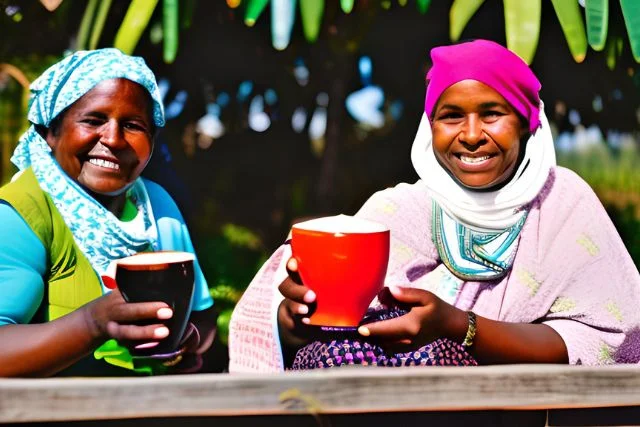Women in Coffee Farming: Nurturing Beans and Breaking Barriers
Coffee is one of the most beloved beverages worldwide. The coffee industry relies on the labor of smallholder farmers, with an estimated 25 million small-scale coffee producers globally. Women play a significant yet underrecognized role in coffee farming. Their involvement is crucial to supporting family livelihoods and the overall sustainability of coffee production. This article explores the importance of women in coffee farming and the challenges they face. It highlights inspiring stories of pioneering women in coffee while calling for greater empowerment and equality.
What is Coffee Farming?
Coffee farming encompasses the cultivation and processing of coffee cherries into dried coffee beans ready for roasting. It is a labor-intensive process requiring meticulous care in growing, harvesting, and preparing the coffee. Smallholder farms under 5 hectares produce about 70% of the world’s coffee. The coffee industry provides livelihoods for millions of small-scale farmers.
Why Coffee Farming Matters
Coffee is the second most traded commodity globally after oil. The coffee sector is crucial to supporting economic development and sustainability in coffee-producing regions of Latin America, Africa, and Asia. Smallholder coffee farmers depend on income from coffee sales to provide for their families. Strengthening the resilience and productivity of smallholder coffee farms benefits local communities and the global coffee supply chain.
The Significant Yet Undervalued Contributions of Women

Women play a vital role in coffee farming. They are involved in sowing, pruning, pest management, harvesting, post-harvest processing, and marketing. Some estimates suggest women do up to 70% of coffee farm labor. However, their contributions often go unrecognized and uncompensated. This article brings to light the importance of women in coffee and the need for greater support.
Key Takeaways
- Underrecognized Role: Women make significant contributions to coffee farming but often go unnoticed and uncompensated.
- Historical Significance: Women have played a crucial role in coffee farming for centuries, breaking barriers despite historical challenges.
- Ongoing Challenges: Women face obstacles such as limited land ownership, access to credit, and balancing farm work with caregiving.
- Empowerment Initiatives: Programs and organizations are working to empower women in coffee farming, reducing gender inequality and supporting sustainable production.
Historical Perspective: Women’s Longstanding Role in Coffee Farming
Women’s significant involvement in coffee farming is not a new phenomenon. Their labor and knowledge have been integral since coffee was first cultivated centuries ago.
Early Coffee Growing Traditions
Coffee’s origins trace back over 1,000 years to Ethiopia and Yemen. Smallholder farms cultivated heirloom varieties using handpicked methods taught through generations. Women carried invaluable knowledge of soil practices, pruning, harvesting, and processing coffee cherries into beans. Their expertise became part of coffee’s story since its beginnings.
Obstacles for Early Women Coffee Workers
In many traditional coffee-growing societies, women had limited rights to land and farm ownership. Their work was confined to manual labor roles, with men controlling resources and profits. Pioneering women who broke barriers were often denied access to training and leadership roles due to gendered cultural attitudes.
The State of Women in Coffee Farming Today
While progress has been made, women in coffee farming still do not receive equal opportunities. Let us look at the current data and trends surrounding women’s coffee labor.
- Women make up to 70% of manual labor on coffee farms in many countries.
- In Latin America, women participate in 85% of coffee harvesting.
- Women represent just 13% of agricultural landholders globally.
- Few women hold leadership roles in farming cooperatives.
- Women often lack access to financing, training, and farm ownership.
Women undertake critical tasks like sowing, pruning, picking ripe cherries, preparing seedlings, washing, pulping, drying, sorting, and bagging coffee. Their contributions are invaluable, even if their roles often go unpaid and undervalued.
There is also diversity in women’s participation across regions:
- In Mexico, women work mainly in coffee gardens for household consumption. Commercial coffee roles are limited.
- In Kenya, women provide up to 70% of labor, but own just 1% of coffee farms.
- In Vietnam, women strongly lead coffee production and sales, making up 85% of the workforce.
Everywhere, women invest their labor into producing quality coffee we all enjoy. They deserve recognition for their indispensable contributions.
Obstacles Facing Women in the Coffee Sector
Despite their critical involvement, women coffee farmers and workers still encounter many obstacles that limit their success and prosperity.
Persistent Gender Inequality
Traditional gender norms continue to constrain women’s participation. Cultural attitudes in some societies discourage women from accessing education, extension services, and leadership roles. Discrimination persists within families, communities, producer organizations, and government institutions.
Lack of Land Ownership & Credit Access
With limited land rights and collateral, women struggle to obtain financing to invest in farms. Opening a bank account alone can be a hurdle. Just 37% of women coffee farmers have savings accounts versus 54% of men. Restricted access to credit hampers productivity.
Less Training Opportunities
Farmer field schools and agricultural extension programs tend to target men. Many women lack basic literacy skills due to lack of education. This restricts opportunities for agricultural and business training to improve skills.

Household Responsibilities
Women coffee farmers must balance productive farm work with caregiving and domestic tasks. Their triple burden limits time for training, farm maintenance, and access to markets. Lack of childcare and gendered cultural expectations are hindrances.
Vulnerability to Climate Change
Women have limited adaptive capacity to deal with coffee pests, diseases, and climate change impacts. Their lack of land rights inhibits adoption of climate-smart techniques. Environmental stresses disproportionately affect women’s incomes and livelihoods.
Initiatives Uplifting Women in the Coffee Sector
Increasingly, development programs, governments, and the specialty coffee industry are pursuing initiatives to empower women, reduce inequality, and recognize women’s rights in coffee farming.
Projects Providing Training & Resources
- The Coffee Initiative by Hanns R. Neumann Stiftung trains women in coffee quality assessment and agronomy in multiple countries.
- TechnoServe offers community college courses to teach women financial literacy, business skills, and coffee processing.
- Fairtrade requires women’s participation in producer cooperatives and facilitates access to inputs.
Access to Credit & Financing
- Organizations like Root Capital and Whole Planet Foundation provide microcredit tailored to women coffee producers.
- Village savings and loans groups allow women to save money collectively and loan to each other.
- Some coffee cooperatives have women-focused financial programs.

Education & Leadership Programs
- The International Women’s Coffee Alliance (IWCA) offers mentorship and leadership development for women in coffee.
- CQI classes help women learn how to cup and evaluate quality to add value.
Recognition & Certification
- Certifications like Fairtrade require women’s membership on producer boards.
- Some farms use gender-equitable certifications to demonstrate inclusive practices.
- Awards like the IWCA’s Bravo! Award recognize outstanding women in coffee.
Sustainable Coffee Requires Gender Equality
Achieving environmentally and socially sustainable coffee production requires inclusive participation and empowerment of women throughout the coffee sector.
The Gender-Climate Connection
Climate change disproportionately harms smallholder women farmers who lack resources to adapt. At the same time, women’s traditional farming knowledge holds keys to building climate resilience. Their full involvement and equality is critical for sustainable coffee farming.
Ethical Trade Benefits Women
Fairtrade, organic, and ethical certifications that promote gender equality and women’s empowerment lead to positive gains for women, communities, and coffee quality.
Valuing Women Producers
Brands that build direct relationships with women coffee producers help provide higher and more stable incomes. This allows women to invest in families and farms.
Consumers can support sustainability in coffee by choosing ethical brands that specifically promote women’s empowerment.
The Future: Opportunities & Challenges for Gender Equity
What does the future hold for addressing inequities facing women in the global coffee community? Reasons are hopeful, but work remains.
Grounds for Optimism
- Increasing projects empowering women through training, financing, certifications
- Rise of women’s coffee producer cooperatives and networks
- Changing attitudes and recognition of women’s rights
- Activism by women coffee leaders advocating for equality
Persistent Challenges
- Deeply rooted gender discrimination and cultural attitudes are slow to change
- Women continue facing limited access to land, credit, tools, and technology
- Lack of childcare and caregiving duties affect women’s time poverty
- Ongoing vulnerabilities to low income, food insecurity, and climate change
Potential Solutions
- Laws and policies promoting women’s land ownership and inheritance rights
- Grassroots women’s coffee producer groups and networks
- Gender awareness training across all elements of supply chain
- Investment in childcare, education, healthcare, and social support systems
True transformation requires collaborative action across sectors, from governments to NGOs to private industry. But change is happening, bean by bean and community by community.

Brewing a Bright Future for Women in Coffee
While progress has been made, there remains tremendous potential for further empowering and uplifting women across all aspects of the international coffee industry. With increased training, access to resources, and leadership opportunities, women can gain more control over their livelihoods and increased prosperity. There are still many glass ceilings to be shattered.
Challenges and Opportunities in the Coffee Industry
The coffee sector faces ongoing volatility in prices, impacts of climate change, youth disinterest in farming, and changing consumer demands. This brings risks but also openings to rebuild a more inclusive and sustainable coffee industry with gender equity at its core. Women’s traditional knowledge and perspectives will be increasingly vital.
Strategies for Advancing Gender Equality
- Challenge laws and norms that inhibit women’s land rights and ownership.
- Support grassroots women’s coffee producer networks and cooperatives.
- Require and reward participation of women across all elements of coffee supply chains.
- Invest in childcare, healthcare, and education to ease women’s labor burdens.
- Provide equal opportunities for women to access training, financing, certifications and leadership roles.
- Amplify women’s voices, stories and innovations.
Conclusion
The Indispensable Role of Women Coffee Farmers
Women are the backbone of the coffee industry, comprising most of the agricultural labor force. Their meticulous work growing and processing coffee beans creates the essential foundation for a global coffee economy valued at over $200 billion.
Call to Action: Ethical Support of Women Coffee Producers
Consumers, corporations, governments and NGOs must work to actively support women’s empowerment, land rights, and prosperity across coffee farming communities worldwide. This requires addressing persistent inequalities and valuing women’s voices in building a sustainable future coffee industry.
The Future is Female
While barriers remain, women are poised to shatter glass ceilings across all aspects of the international coffee trade. The future can be one of greater shared prosperity through recognizing and rewarding women’s indispensable work as coffee producers. The time has come to brew transformational gender equality and inclusion throughout coffee’s supply chains – from seed to cup.








